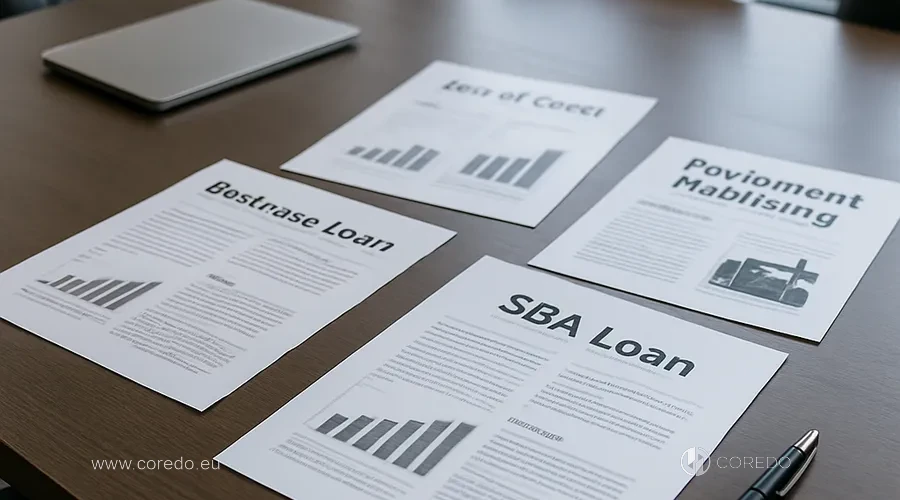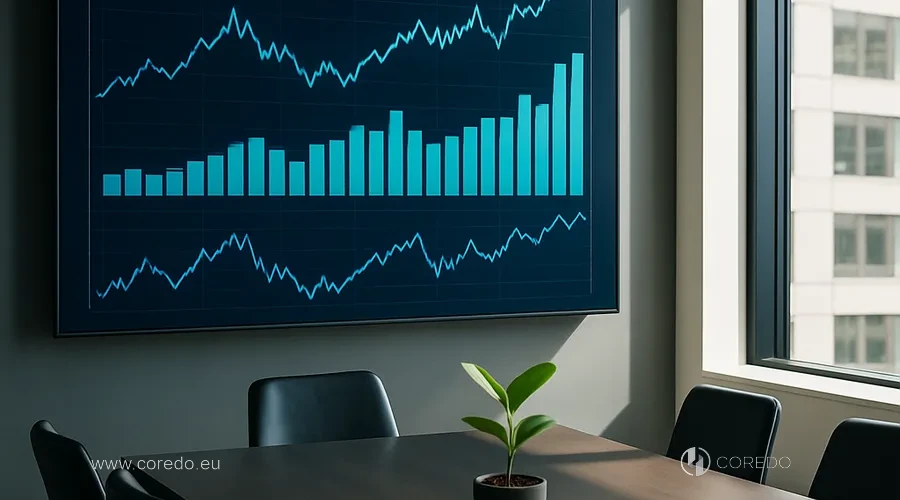Did you know that, according to the European Investment Bank, nearly 40% of small and medium-sized enterprises in the EU face refusals when attempting to obtain a business loan, and in Asia this figure reaches 55%? In conditions where access to corporate financing becomes a strategic advantage, choosing the right lending instrument determines not only the pace of growth but also the company’s resilience on the international market.
If you are looking not only for an overview but also for concrete solutions – read to the end.
Types of business loans for companies

The modern corporate finance market offers a wide range of instruments, and the leader’s task is to choose the one that aligns with the business goals, asset structure and regulators’ requirements.
Investment loan and targeted loan for companies

COREDO’s experience shows that, for successfully obtaining an investment loan in the EU or Singapore, preparing a detailed business plan is critically important, including financial modeling, analysis of return on investment (ROI) and a collateral strategy. For example, when supporting a financing deal for a tech startup in the Czech Republic, our team developed a structure of a targeted loan with deferred payments, which allowed the client to reach operating profitability before repayments began.
A targeted loan for companies is often used for contract execution or implementation of specific projects. Here, banks and alternative lenders assess not only the legal entity’s creditworthiness but also the quality of the contract base, the reputation of counterparties, and the availability of bank guarantees.
Working capital loan, overdraft and seasonal financing

At COREDO we recommend using working capital loans to cover cash gaps and seasonal peaks, especially in retail and agribusiness. An overdraft for legal entities is a flexible form of lending where a company can temporarily exceed the balance on its current account within an established limit. This approach is convenient for managing the company’s credit portfolio and maintaining financial stability during periods of high volatility.
The solution developed at COREDO for an export-oriented company in Estonia included a combined package: a working capital loan plus a credit line with automatic renewal for the peak sales period.
Business leasing and sale & leaseback

Financial leasing allows the use of an asset without one-time expenses, and sale & leaseback frees up capital from existing assets. Our experience at COREDO has shown that leasing schemes are especially effective for companies seeking to preserve liquidity and optimize tax burden.
Credit line and flexible financial instruments

A credit line for legal entities: a universal instrument for companies with regular financing needs. It allows flexible management of the credit limit, drawing funds as needed.
This approach was implemented when supporting a deal to construct a production complex in the United Kingdom, where the credit line was syndicated among three banks with different currencies and repayment schedules.
Alternative funding sources: crowdlending and microfinance
Crowdlending for business and microfinancing for companies: innovative financial instruments that are actively developing in the EU and Asia. They allow raising funds through digital lending platforms, bypassing traditional banks. The COREDO team has implemented several projects to attract alternative financing for startups in Singapore and Estonia, where crowdlending became a key source
shortage of working capital.
Thus, the choice of appropriate financing instruments depends on the company’s goals, and we will consider the specifics and comparison of lending conditions in the EU, Asia and Africa below.
Lending conditions for business in the EU, Asia and Africa
How to choose the optimal loan for a legal entity in the EU
In Europe, banks impose strict requirements on the business plan, the company’s credit history and collateral for a business loan. For successful completion of the borrower’s Due Diligence it is important to prepare a package of documents in advance, including financial statements, confirmation of sources of income and information about beneficiaries. Special attention is paid to compliance procedures and KYC for legal entities.
A feature of leasing for legal entities in Europe is the possibility of integrating ESG factors and participating in government business support programs.
Types of lending and alternative sources of financing in Asia
The Asian market is characterized by a high share of digital lending platforms, rapid development of microfinance and flexible collateral requirements. In Singapore and Hong Kong, innovative financial instruments are actively used, including crowdlending, factoring and subsidized loans for small and medium-sized businesses.
Business lending in Africa: opportunities and limitations
African countries offer interesting opportunities for companies focused on export and infrastructure projects. On the other hand, interest rates are higher here and loan terms are shorter. Government business support programs and international corporate lending are key sources of financing.
Comparison of lending conditions for companies in different countries
| Parameter | EU | Asia | Africa |
|---|---|---|---|
| Interest rate | from 2% | from 4% | from 8% |
| Loan term | up to 10 years | up to 7 years | up to 5 years |
| Collateral requirements | high control | moderate | flexible |
| AML/compliance | strict | moderate | moderate |
| Alternative sources | developed | actively developing | limited |
Thus, the specifics of lending conditions depend on the region and type of transaction, and next we will consider the key collateral requirements for a business loan.
Requirements and collateral for a business loan
Documents and guarantees for obtaining a business loan
To arrange a business loan, banks and financial organizations require an extensive package of documents: constituent documents, financial statements, tax returns, a business plan, information about beneficiaries and confirmation of sources of funds. At COREDO we pay special attention to preparing a legally flawless set, which significantly speeds up the approval process. Bank guarantees and risk insurance often become a mandatory requirement when financing large contracts.
Credit scoring and assessment of a legal entity’s creditworthiness
Credit scoring for business is a comprehensive assessment of a company’s financial stability, its credit history, asset structure and quality of management. The solution developed by COREDO for an international trading company included the implementation of an internal financial monitoring system, which made it possible to increase the legal entity’s creditworthiness and obtain more favorable corporate financing terms.
Collateral, pledges and guarantees for corporate loans
Collateral: a key element in structuring a credit transaction. This can include real estate, equipment, inventory or bank deposits. Guarantees for corporate credit are often required for companies with a limited history or startups. At COREDO we recommend carefully analyzing the structure of collateral to minimize risks and ensure flexibility when restructuring debt.
AML and compliance in business lending
How AML checks are conducted in corporate lending
AML (anti-money laundering) requirements in lending to companies are becoming stricter in all jurisdictions. The bank or lender is obliged to carry out a comprehensive AML check, including KYC for legal entities, analysis of sources of funds, beneficial owners and the structure of the corporate group. COREDO’s practice confirms: business transparency and willingness to disclose information significantly speed up the loan approval process.
Due diligence of the borrower includes not only checking the finances, but also analyzing business reputation, litigation and compliance with international standards.
Legal support for credit transactions: nuances and best practices
Legal support for credit transactions is an integral part of corporate financing. Compliance procedures, structuring a credit transaction, agreeing on collateral terms and the payment schedule require high expertise and knowledge of the regulatory requirements of a specific jurisdiction. The COREDO team implemented projects where Legal expertise allowed the client to avoid hidden risks associated with cross-border transactions and multi-currency financing.
Risks of corporate lending and ROI
How to reduce risks when arranging a business loan
Credit risks are an integral part of any corporate financing. Key tools to minimize them include diversifying the company’s loan portfolio, restructuring corporate debt, and refinancing business loans when market conditions change. At COREDO we recommend implementing regular financialmonitoring and use bank guarantees, which reduces the likelihood of default and ensures the return on investment.
ROI metrics and assessment of the profitability of borrowed funds
Return on investment (ROI) in business lending is assessed by indicators such as operating profit, margins, payback period, and cost of borrowed funds. It is important to take into account not only the direct interest rates on a business loan but also hidden costs: fees, insurance, and currency risks.
Credit instruments for scaling the business
How to prepare a business plan for an investment loan
A quality business plan for obtaining a loan is not just a formality but a strategic tool. It should include market analysis, financial modeling, risk assessment and a strategy for ensuring return on investment. The COREDO team supports clients at all stages of preparation: from data collection to presenting the project to the bank’s credit committee.
Mistakes and common problems when arranging business loans
Typical mistakes companies make when applying for loans: underestimating compliance requirements, incomplete document preparation, ignoring the company’s credit history, and lack of a credit limit management strategy. COREDO’s experience shows that timely legal support and financial monitoring make it possible to avoid refusals and obtain more favorable conditions.
To choose the right business loan and increase the chances of approval, it is important to determine financing goals in advance and compare the terms of different programs – let’s look at the key criteria in the next section.
How to choose a business loan
- Analyze financing goals: an investment loan is suitable for long-term projects, a working capital loan for current expenses, leasing for renewing equipment without losing liquidity.
- Compare terms in different jurisdictions: interest rates, collateral requirements, terms and compliance procedures vary significantly.
- Prepare the business plan and the document package in advance: this speeds up approval and increases the chances of obtaining better terms.
- Consider all risks and hidden costs: analyze not only the cost of the loan but also potential legal and operational risks.
- Use comprehensive support and legal services: COREDO’s experience confirms that a systematic approach minimizes errors and saves time.
- Implement financial monitoring and manage the company’s credit portfolio: this increases creditworthiness and business resilience.
If you are aiming to scale your business using credit instruments, seeking flexible financial solutions and a reliable partner for comprehensive support: the COREDO team is ready to offer expert solutions tailored to your objectives and the specifics of the jurisdiction.